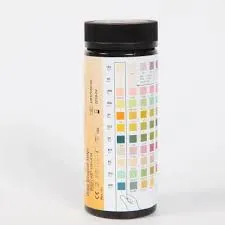Dec . 18, 2024 14:00 Back to list
Wholesale Pricing for FOBT Test Kits from Manufacturers
Understanding the Wholesale Cost of FOBT Test Manufacture
Determining the wholesale cost of the Fecal Occult Blood Test (FOBT) is a critical factor that influences healthcare providers, laboratories, and manufacturers alike. FOBT is a non-invasive screening tool commonly used to detect hidden blood in the stool, which can be an early indicator of colorectal cancer or other gastrointestinal disorders. As the demand for early screening increases, understanding the costs involved in manufacturing these tests becomes essential for ensuring accessibility and affordability in the healthcare industry.
What is FOBT?
FOBTs are diagnostic tests that identify small amounts of blood in a person’s stool that are not visible to the naked eye. These tests play a pivotal role in routine health checks and preventative screenings, especially in populations at higher risk for colorectal cancer. The convenience of home testing kits has made FOBTs popular, leading to an increase in their production and distribution.
Factors Affecting Wholesale Costs
Several factors contribute to the wholesale cost of FOBT manufacturing. Understanding these can help stakeholders make informed decisions regarding purchasing, inventory management, and pricing strategies.
1. Raw Materials The primary components of FOBT kits include reagents, packaging materials, and the testing device itself. Fluctuations in the prices of these raw materials can significantly impact manufacturing costs. For instance, if the cost of chemical reagents rises due to market demand or supply chain issues, the overall cost to produce each test may increase.
2. Manufacturing Processes The technology and methods used to manufacture FOBT kits also play a pivotal role in determining costs. High-tech manufacturing processes that ensure precision and reliability typically require significant investment. Additionally, facilities that comply with rigorous health and safety standards may incur additional costs that are then transferred to wholesale pricing.
wholesale cost of fobt test manufacturer

3. Regulatory Compliance FOBTs are subject to strict regulations to ensure their safety and efficacy. Securing necessary certifications, such as those from the FDA (Food and Drug Administration) in the United States or other relevant bodies internationally, requires time and resources. Manufacturers often bear these compliance costs, influencing the final wholesale price.
4. Volume of Production Economies of scale can significantly affect the wholesale cost of FOBT tests. Larger manufacturers that can produce tests in bulk often benefit from reduced per-unit costs compared to smaller producers. This difference in scale may lead to competitive advantages, allowing larger companies to offer lower wholesale prices.
5. Market Competition The level of competition in the FOBT market can also influence wholesale pricing. In a saturated market with multiple suppliers, manufacturers might reduce prices to maintain or capture market share. Conversely, in a market dominated by a few players, prices may be higher due to limited competition.
6. Distribution and Logistics The costs associated with distributing FOBT kits to healthcare providers and homeowners can also impact the wholesale price. Effective logistics and distribution partnerships are crucial for maintaining affordability, especially in remote areas where transportation costs can escalate.
7. Research and Development Continuous innovation is essential for improving FOBT accuracy and user experience. Ongoing R&D investment can lead to higher initial costs for manufacturers, which may be reflected in the cost of the tests they offer wholesale.
Conclusion
The wholesale cost of FOBT manufacturing is influenced by a complex interplay of factors, including raw material costs, manufacturing processes, regulatory requirements, production volume, market competition, distribution logistics, and R&D investments. Understanding these dynamics is crucial not only for manufacturers looking to optimize their pricing strategies but also for healthcare providers aiming to ensure patients have access to necessary screening tools.
As the healthcare landscape evolves and the emphasis on early detection and preventive care grows, stakeholders must remain informed about the costs associated with FOBT production. This awareness will ultimately support better decision-making processes that prioritize patient care while balancing financial sustainability. By focusing on cost-effective manufacturing and distribution strategies, the FOBT market can contribute to the early detection of colorectal cancer and better health outcomes for millions of individuals worldwide.
-
Reliable Early Pregnancy Test Kit Supplier - Multi Plastic Cassette Options
NewsJul.30,2025
-
Transferrin Rapid Test Cassette – Reliable Tumor Marker Detection
NewsJul.29,2025
-
Accurate Follicle Stimulating Hormone Test Kit | Rapid Reliable Results
NewsJul.29,2025
-
High Accuracy LH Ovulation Test Kit - Digital Results & Wholesale Options
NewsJul.29,2025
-
HbsAg Blood Rapid Test Kit for Fast & Accurate Hepatitis B Detection
NewsJul.28,2025
-
Sterile Urine Cup for Safe & Easy Collection | High-Quality Specimen Cups
NewsJul.28,2025

